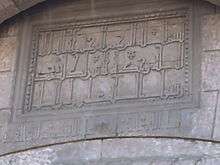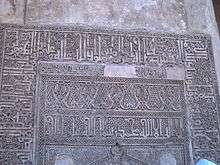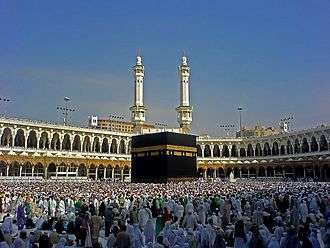Adhan
| Part of a series on |
| Islam |
|---|
 |
|
Related topics |
|
The adhan (Arabic: أَذَان [ʔaˈðaːn]), (or azan as pronounced in Afghanistan, Azerbaijan, Bangladesh, India, Indonesia, Iran, Kazakhstan, Malaysia, Egypt, Pakistan, Russia, and Turkmenistan, ezan in Turkey, Bosnia and Herzegovina, Albania, Kosovo, azon in Uzbekistan and Tajikistan, and baang in some regions of Pakistan, Kurdistan, India, and Aceh, Indonesia) is the Islamic call to worship, recited by the muezzin at prescribed times of the day. The root of the word is ʾadhina أَذِنَ meaning "to listen, to hear, be informed about". Another derivative of this word is ʾudhun (أُذُن), meaning "ear".
Adhan is called out by a muezzin from the mosque five times a day, traditionally from the minaret, summoning Muslims for mandatory (fard) worship (salat). A second call, known as iqama, (set up) then summons Muslims to line up for the beginning of the prayers. The main purpose behind the multiple loud pronouncements of adhan in every mosque is to make available to everyone an easily intelligible summary of Islamic belief. It is intended to bring to the mind of every believer and non-believer the substance of Islamic beliefs, or its spiritual ideology. In modern times, loudspeakers have been installed on minarets for this purpose.
The adhan recites the Takbir (God is great)[1] followed by the Shahada (There is no god but God, Muhammad is the messenger of God).[2] This statement of faith, called the Kalimah, is the first of the Five Pillars of Islam.
| Adhan | |
| Arabic | أَذَان |
|---|---|
| Romanization | aḏān, azaan, adhaan |
| Literal meaning | call to prayer |
Mu'adhan

The Mu'adhan or pronounced "Mu'azzin" or "Mu'ezzin" is the person who recites the adhan from the mosque. Typically in modern times, this is done using a microphone: a recitation that is consequently broadcast to the speakers usually mounted on the higher part of the mosque's minarets, thus calling those nearby to prayer. The Mu'adhan is chosen for his talent and ability in reciting the adhan beautifully, melodiously and loudly for all Muslims to hear. This is one of the important duties in the mosque, as his companions and community rely on him in his call for Muslims to come to pray in congregation. The Imam leads the prayer five times a day. The first Mu'adhan in Islam was Bilal Ibn Rabah, a freed slave from Africa.[3]
Text
Sunni
| Recital | Arabic | Transliteration | Translation |
|---|---|---|---|
| 4x | ٱللهُ أَكْبَر | Allāhu akbar | Allah1 is the greatest. |
| 2x | أَشْهََدُ أَنْ لاَ إِلَـٰهَ إِلَّا ٱللهُ | Ash-hadu an-lā ilāha illā allāh | I acknowledge that there is no god but Allah1. |
| 2x | أَشْهََدُ أَنَّ مُحَمَّدًا رُسُولُ ٱلله | Ash-hadu anna Muhammadan-Rasul ullāh | I acknowledge that Muhammad is the Messenger of Allah (After prophethood). |
| 2x | حَيَّ عَلَىٰ ٱلصَّلاة | Hayya'alas-ṣalāh | Hasten to prayer (Salah). |
| 2x | حَيَّ عَلَىٰ ٱلْفَلاَح | Hayya ʿalal-falāḥ | Hasten to success. |
| 2x 2 *(Only for Fajr prayer) |
ٍٱلصَّلاَةُ خَيْرٌ مِنَ ٱلنَّوم | As-salatu Khayrun Minan-nawm | Prayer is better than sleep (Recited only for Fajr prayer's Adhan)3 |
| 2x | الله أكبر | Allāhu akbar | God1 is greatest. |
| 1x | لا إله إلا الله | Lā ilāha illā-Allāh | There is no god but Allah1. |
- ^1 Allah is a compound word of the definite article al and the Arabic word for "god, or deity" (ilah), meaning "The (One) God".[8]
- ^2 Followers of the Maliki madh'hab say this line twice and repeat the following two lines before line four, as noted in Sahih Muslim, Book 4, Ch. 2, No. 0740.
- ^3 The line "Prayer is better than sleep" is used only for the first prayers of the day at dawn (fajr prayer; Salat al-fajr).
Shi'a Islam[4][5][6][7][9]
| Recital | Arabic | Transliteration | Translation[10] |
|---|---|---|---|
| 4x | الله أكبر | Allāhu akbar, Allāhu akbar | Allah is greatest, God is greatest. |
| 2x | أشهد ألا إله إلا الله | Ash-hadu an-lā ilāha illā allāh | I bear witness that there is no deity but Allah. |
| 2x | أشهد أن محمدا رسول الله | Ash-hadu anna Muhammadan-Rasulullāh | I bear witness that Muhammad is the Messenger of Allah. |
| 2x1 | أشهد ان عليا ولي الله | Ash-hadu anna Alīyan walī-ullāh | I testify that Ali is the Viceregent (wali) of Allah. |
| 2x | حي على الصلاة | Hayya ʿala ṣ-ṣalāt | Hasten to worship (salat). |
| 2x | حي على الفلاح | Hayya ʿala 'l-falāḥ | Hasten to success. |
| 2x | حي على خير العمل | Ḥayya ʿala khayr al ʿamal | The time for the best of deeds has come! |
| 2x | الله أكبر | Allāhu akbar | Allah is the greatest. |
| 2x | لا إله إلا الله | Lā ilāha illā-Allāh | There is no deity but Allah. 3 |
*^1 According to Usuli Twelver Shi'a scholars, Ashhadu ana Alian waliullah ("I testify that Ali is the vicegerent of Allah") is not a part of adhan and iqamah but some say it is recommended (Mustahabb) to say that twice after third part of the adhan which is Ash-hadu anna Muhammadan-rasūl ullāh. Whereas Akhbari Shia Twelver consider Ashhadu ana Alian waliullah ("I testify that Ali is the vicegerent of Allah") as an integral part of adhan and iqamah without same both are incomplete.[11]
Fatimid/Ismaili/Dawoodi Bohra believe and include and recite this at same place, twice in main adhan, but not in Iqama.
Fatimid/Ismaili/Dawoodi Bohra also recite mohammadun -va- ali-un khayr-ul- basar va itarat-o- homa khayr-ul-itar (Muhammad and Ali are the best gentleman and their progeny is the best of progeny) twice after 6th part Ḥayya ʿala-khayr il-ʿamal. At the end of Azaan, they recite Lā ilāha illā llāh twice (but once in Iqama). This tradition is continued from their first Da'i al-Mutlaq, Zoeb bin Moosa (1132 CE), after their 21st Imam, At-Tayyib Abi l-Qasim, and claim this is true Fatimid tradition.[12][13][14]
Views
Sunni view
Sunnis state that the adhan (azan) was not written or said by the Islamic prophet, Muhammad, but by one of his Sahabah (his companions). Umar, a prominent sahabi of Muhammad, had a vision in his dream, in which the call for prayers was revealed to him by God. He later related this to his companions. Meanwhile, this news reached Muhammad, and he liked it and confirmed it. Because of his stunning voice Muhammad chose a freed Habeshan slave by the name of Bilal ibn Rabah al-Habashi to make the call for prayers. Muhammad preferred the call better than the use of bells (as used by the Christians) and horns (as by the Jews).[4][5][6][7][15]
During the Friday prayer (Salat Al Jumu'ah), there is one adhan but some Sunni Muslims increase it to two adhans; the first is to call the people to the mosque, the second is said before the Imam begins the khutbah (sermon). Just before the prayers start, someone amongst the praying people recites the iqama as in all prayers. The basis for this is that at the time of the Caliph Uthman he ordered two adhans to be made, the first of which was to be made in the marketplace to inform the people that the Friday prayer was soon to begin, and the second adhan would be the regular one held in the mosque. Not all Sunnis prefer two adhans as the need for warning the people of the impending time for prayer is no longer essential now that the times for prayers are well known.
Shi'a view
Shi'a sources state Muhammad, according to God's command, ordered the adhan as a means of calling Muslims to prayer. Shi'a Islam teaches that no one else contributed, or had any authority to contribute, towards the composition of the adhan.[4][5][6][7][9]
Other Shi'a sources state that Bilal ibn Rabah al-Habashi was, in fact, the first person to recite the adhan publicly out loud in front of the Muslim congregation.
The fundamental phrase Lā- ilāha-illā-al-lāh is the foundation stone of Islam along with the belief in it. It declares that "there is no god but the God". This is the confession of Tawhid or the "doctrine of Oneness [of God]".
The phrase Muḥammadun –rasulu-llāh fulfils the requirement that there should be someone to guide in the name of God, which states Muhammad is God's Messenger,rasul, nabi (prophet). This is the acceptance of prophet-hood or Nabuwat of Muhammad.


Muhammad declared Ali (Ali bin Abu Talib) as his successor, at Ghadir Khumm, which was required for the continuation of his guidance. According to the hadith of the pond of Khumm, Muhammad stated that "Of whomsoever I am the mawla, Ali is his mawla". Hence, it is recommended to recite the phrase ʿalīyun walī allāh means "Ali is His (God's) Wali "the headman."
There are several Ayahs in the Quran[9][16] and hadiths in the Sunnah confirming the Shia belief of the 12 Imams.
In one of the Qiblah of Ma'ad al-Mustansir Billah (1035–1094) of Fatemi era masjid of Qahira (Mosque of Ibn Tulun) engraved his name and kalimat ash-shahādah as lā ʾilāha ʾilā-llāh, muḥammadun rasūl allāh, ʿalīyun walī allāh.
Adhan reminds everyone, these three Islamic teaching Tawhid, Nabuwat and Imamate before each prayer. These three emphasise devotion to God, Muhammad and Imam, which are so linked together that these can not be viewed separately. One leads to other and finally to God.
The phrase is optional to some Shia as justified above. They feel that Ali's Valayat is self-evident, a testification and need not be declared. However, the greatness of God is also taken to be self-evident, but Muslims still declare Allāhu ʾAkbar to publicize their faith. This is the reason that the most Shia give for the recitation of the phrase regarding Ali.
Dua (Invocation)
What to Recite During Adhan (Call to Prayer)
While listening to the adhan, Muslims repeat the same words silently, except when the muezzin says:" حي على الصلاة أو حي على الفلاح " (ḥayya ʿala ṣ-ṣalāh or ḥayya ʿala l-falāḥ)[17] they silently say:" لا حولا و لا قوة إلا بالله " (lā hawla wa lā quwata illā billāh) (there is no strength or power except from God).[18]
What to Recite after Adhan
Immediately following the Adhan, Muslims recite the following dua (supplications):
1. ﻭَﺃَﻧَﺎ ﺃَﺷَْﻬَﺪُ ﺃَﻥْ ﻟَﺎ ﺇِﻟَﻪَ ﺇِﻟَّﺎ ﺍﻟﻠﻪُ ﻭَﺣْﺪَﻩُ ﻟَﺎ ﺷَﺮِﻳﻚَ ﻟَﻪُ ﻭَﺃَﻥَّ ﻣُﺤَﻤَّﺪﺍً ﻋَﺒْﺪُﻩُ ﻭَﺭَﺳُﻮﻟُﻪُ، ﺭَﺿِﻴﺖُ ﺑِﺎﻟﻠﻪِ ﺭَﺑَّﺎً ﻭَﺑِﻤُﺤَﻤَّﺪٍ ﺭِﺳُﻮﻻً ﻭَﺑِﺎﻹِْﺳﻼَﻡِ ﺩِﻳﻨﺎً ".
Wa 'anaa 'ash-hadu 'an laa 'ilaaha 'illallaahu wahdahu laa shareeka lahu wa 'anna Muhammadan 'abduhu wa Rasooluhu, radheetu billaahi Rabban, wa bi-Muhammadin Rasoolan wa bil'islaami deenan.[19]
English: I bear witness that there is no god but Allah alone with no partner and that Muhammad is His slave and Messenger, and the Lord God's chosen messenger is Muhammad and Islam is his religion.
2. An invocation of blessings on the Prophet Muhammad (صلى الله عليه وسلم):
ﺍﻟﻠﻬﻢ ﺻــﻞ ﻋﻠٰﯽ ﻣﺤﻤﺪ ﻭ ﻋﻠٰﯽ ﺁﻝ ﻣﺤﻤﺪ ﻛﻤﺎ ﺻﻠﻴﺖ ﻋﻠٰﯽ ﺇﺑﺮﺍﻫﻴﻢ ﻭ ﻋﻠﻰ ﺁﻝ ﺇﺑﺮﺍﻫﻴﻢ ﺍﻧﻚ ﺣَﻤِﻴﺪٌ ﻣَجيد َ ﺍﻟﻠﻬﻢ ﺑﺎﺭﻙ ﻋﻠٰﯽ ﻣﺤﻤﺪ ﻭ ﻋﻠٰﯽ ﺁﻝ ﻣﺤﻤﺪ ﻛﻤﺎ ﺑﺎﺭ ﻛﺖ ﻋﻠٰﯽ ﺇﺑﺮﺍﻫﻴﻢ ﻭ ﻋﻠﻰ ﺁﻝ ﺇﺑﺮﺍﻫﻴﻢ ﺍﻧﻚ ﺣﻤﻴﺪ ﻣﺠﻴﺪ
Allaahumma salli alaa Muhammadin wa alaa aali Muhammadin, kamaa sallayta alaa Ibraaheema wa alaa aali Ibraaheema innaka Hameedun Majeed. Allahumma Baarik alaa Muhammadin wa alaa aali Mohammadin kamaa baarakta alaa Ibraaheema wa alaa aali Ibraaheema innaka Hameedun Majeed[20]
3. Waseelah for the Prophet is then requested ( صلى الله عليه وسلم):
ﺍﻟﻠﻬﻢ ﺭﺏ ﻫﺬﻩ ﺍﻟﺪﻋﻮﺓ ﺍﻟﺘﺎﻣﺔ ﻭﺍﻟﺼﻼﺓ ﺍﻟﻘﺎﺋﻤﺔ ﺁﺕ ﻣﺤﻤﺪﺍ ﺍﻟﻮﺳﻴﻠﺔ ﻭﺍﻟﻔﻀﻴﻠﺔ ﻭﺍﺑﻌﺜﻪ ﺍﻟﻤﻘﺎﻡ ﺍﻟﻤﺤﻤﻮﺩ ﺍﻟﺬﻱ ﻭﻋﺪﺗﻪ
Allahumma rabba hadhihi-d-da‘awati-t-tammah wa-s-Salati- l-qa’imah, ati Muhammadan il-wasilata wa-l-fadilah wa-b‘ath-hu maqamam mahmudan illadhi wa‘adtah[21]
4. Dua are then made directly to Allah, between the adhan and the iqamaah.
Muhammad said: "Repeat the words of the Mo'athen and when you finish, ask ALLAH what you want and you will get it"[22]
Form
Each phrase is followed by a longer pause and is repeated one or more times according to fixed rules. During the first statement each phrase is limited in tonal range, less melismatic, and shorter. Upon repetition the phrase is longer, ornamented with melismas, and may possess a tonal range of over an octave. The adhan's form is characterised by contrast and contains twelve melodic passages which move from one to another tonal center of one maqam a fourth or fifth apart. The tempo is mostly slow; it may be faster and with fewer melismas for the sunset prayer. During festivals, it may be performed antiphonally as a duet.[23]
Turkey
As an extension of the reforms brought about by the establishment of the Republic of Turkey in 1923, the Turkish government at the time, encouraged by Atatürk, introduced secularism to Turkey. The program involved implementing a Turkish adhan program as part of its goals, as opposed to the conventional Arabic call to prayer.[24]
The adhan was replaced with the following:
Tanrı uludur
Şüphesiz bilirim, bildiririm
Tanrı'dan başka yoktur tapacak.
Şüphesiz bilirim, bildiririm;
Tanrı'nın elçisidir Muhammed.
Haydin namaza, haydin felaha,
Namaz uykudan hayırlıdır.
Following the conclusion of said debates, the Presidency of Religious Affairs (Diyanet İşleri Başkanlığı) released an official mandate on July 18, 1932, announcing the decision to all the mosques across Turkey, and the practice was continued for a period of 18 years.
On July 16, 1950, a new government was sworn in, led by Adnan Menderes, which restored Arabic as the liturgical language.
Turkish National Anthem
The adhan is mentioned in the eighth verse of İstiklâl Marşı, the Turkish national anthem:
O glorious God, the sole wish of my soul is that,
No heathen's hand should ever touch the bosom of my sacred Temples.
These adhans, whose shahadahs are the foundations of my Dīn (religion),
May their noble sound last loud and wide over my eternal homeland.
See also
References
- ↑ H Azodanloo (1992), Formalization of friday sermons and consolidation of the Islamic republic of Iran, Journal of Critical Studies of Iran & the Middle East, 1(1), 12-24
- ↑ N Mohammad (1985), The doctrine of jihad: An introduction, Journal of Law and Religion, 3(2): 381-397
- ↑ William Muir, The Life of Mohammad from Original Sources, reprinted by Adamant Media ISBN 1-4021-8272-4
- 1 2 3 4 Sahih Bukhari 89.329
- 1 2 3 4 Sahih Muslim : Book 020: Number 4477, 4478, 4480, 4481, 4482, 4483
- 1 2 3 4 Sunan Abu Dawood : Book 36: Number 4266
- 1 2 3 4 Sunan al-Tirmidhi (Arabic)
Chapter of Fitan,
2:45 (India) and 4:501 Tradition # 2225 (Egypt)
Hadith #2149 (numbering of al-'Alamiyyah) - ↑ "God". Islam: Empire of Faith. PBS. Archived from the original on 2014-03-27. Retrieved 18 December 2010.
- 1 2 3 Quran : Surah Sajda: Ayah 24-25
- ↑ Adapted from: Adhan and Iqamah Archived July 20, 2011, at the Wayback Machine.
- ↑ "Akhbari". Akhbari. Retrieved 2013-12-31.
- ↑ Islamic Laws : Rules of Namaz » Adhan and Iqamah Archived September 14, 2008, at the Wayback Machine.
- ↑ Importance and Conditions of Prayers - Question #466 Archived July 8, 2009, at the Wayback Machine.
- ↑ "Adhan Call to Prayer". duas.org. Retrieved on 25 August 2016.
- ↑ Haykal, Muhammad Husayn. The Life of Muhammad. p. 200.
- ↑ Quran : Al‑Ahzaab: Ayah 33
- ↑ Muwatta
- ↑ Sahîh Al-Bukhari #548
- ↑ Sahîh Muslim 386
- ↑ Sahîh Al-Bukhari 3370
- ↑ Sahih Al-Bukhari 588
- ↑ Abu Dawud 524
- ↑ Touma, Habib Hassan (1996). The Music of the Arabs, p.157-158, trans. Laurie Schwartz. Portland, Oregon: Amadeus Press. ISBN 0-931340-88-8.
- ↑ The Adhan in Turkey Archived April 12, 2009, at the Wayback Machine.
External links
| Wikimedia Commons has media related to Adhan. |
| Wikisource has the text of the 1911 Encyclopædia Britannica article Aẓān. |
- Azan / Adhan MP3 Downloads
- Azan / Adhan MP3 Downloads
- Meaning of the Adhan
- Azan/Prayer Times Quibla directions and Azan are available for any one looking for Muslim Prayer Timings.
- Online Adhan Web Page : http://www.adhanonline.com (Eng)
